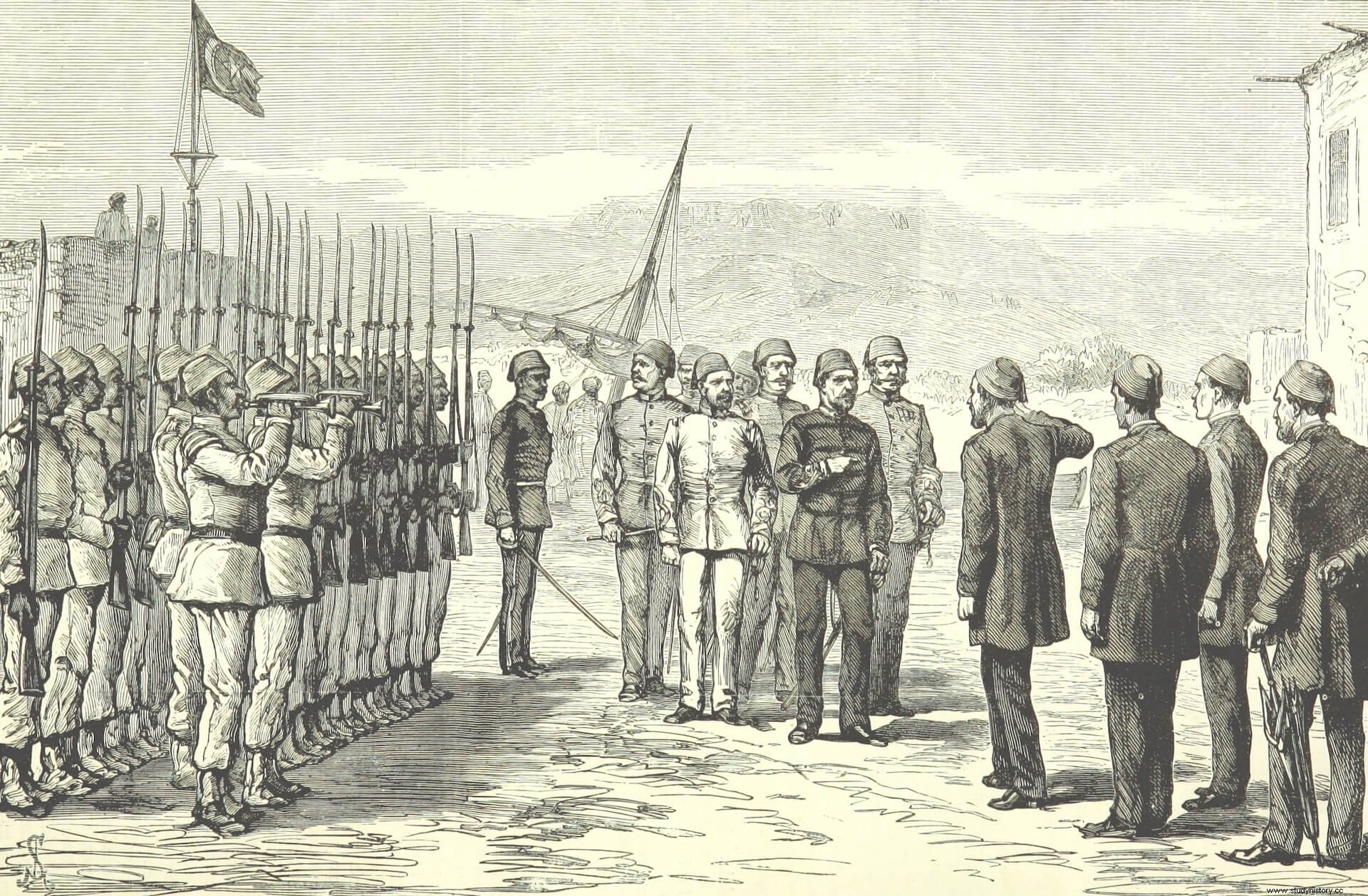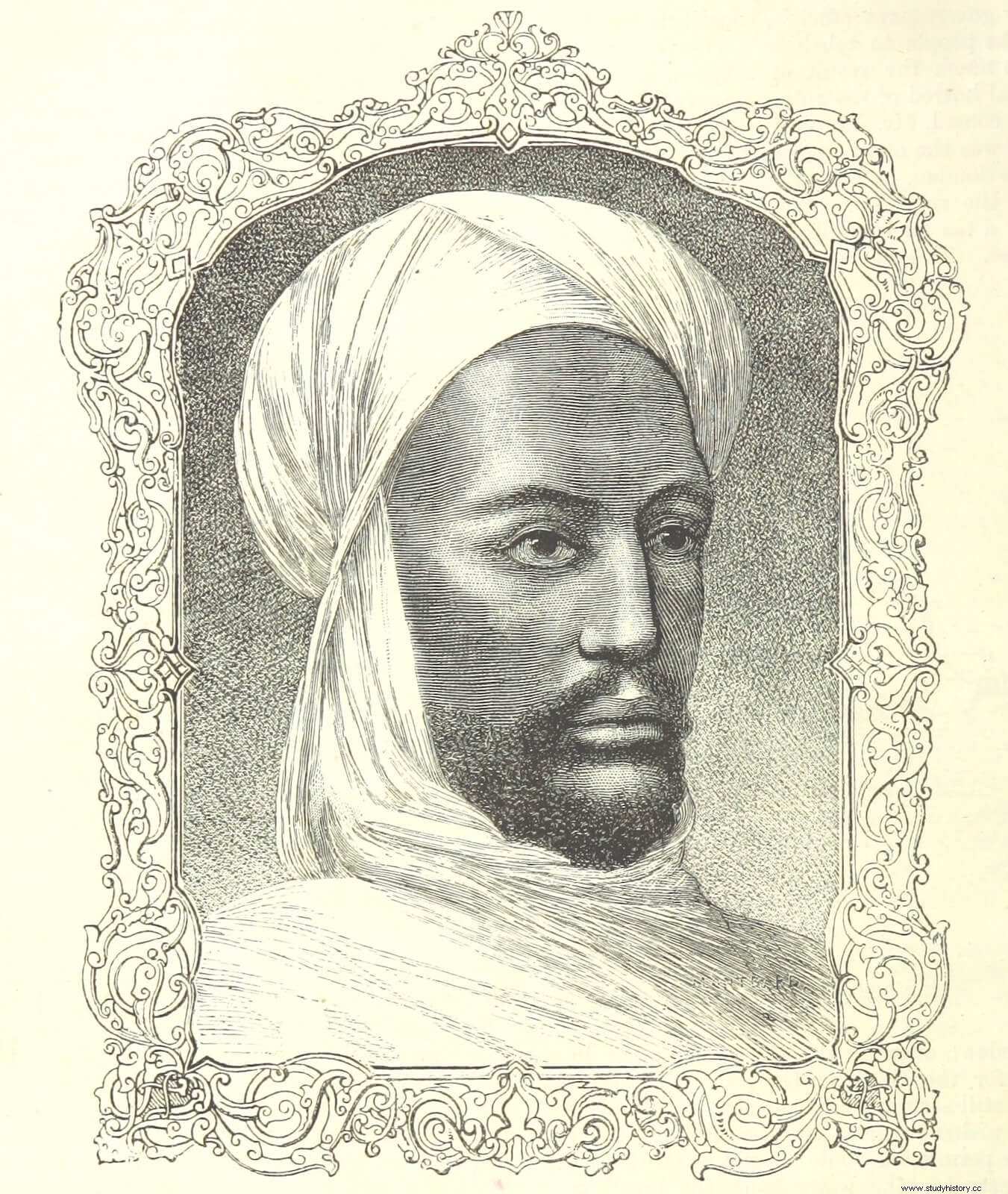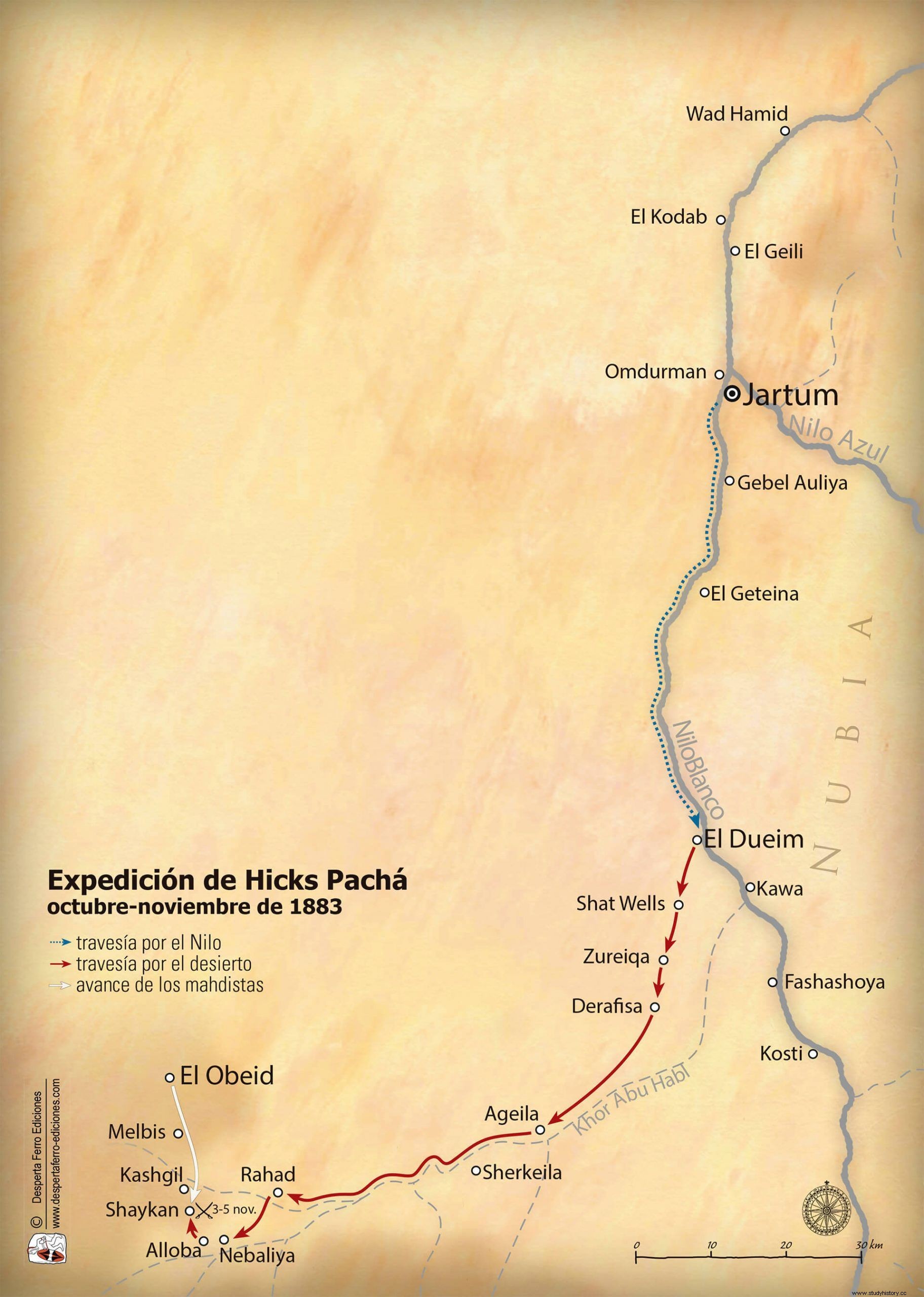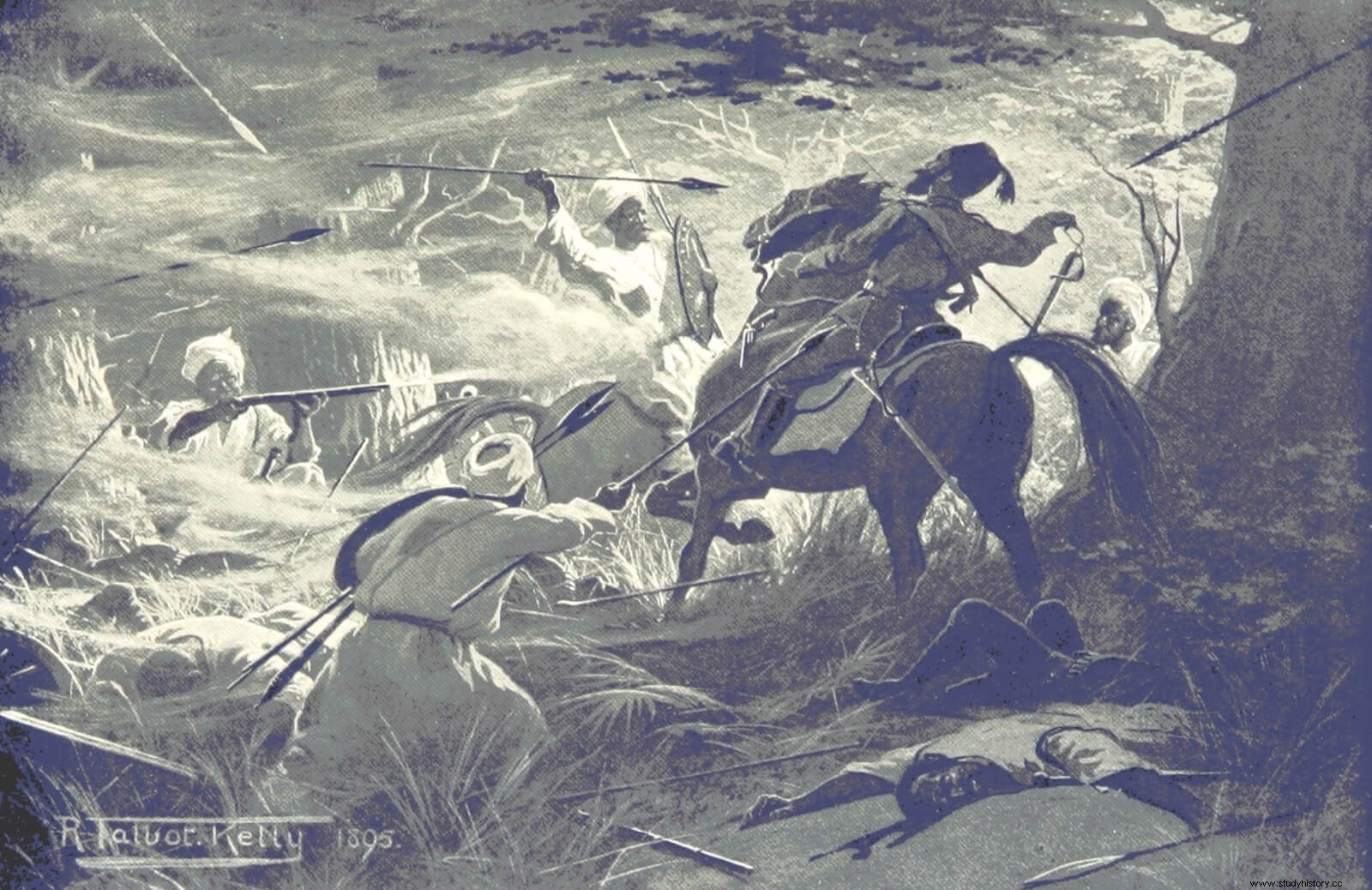
Herlth crouched behind a hastily heaped embankment of earth the night before, sinking deeper into the ground as shells whizzed and hissed around them. He was a former Austrian Uhlans (Lancers) officer at the time serving in the 11,000-man Turkish-Egyptian Army commanded by General William Hicks Pasha , an Englishman recently appointed commander-in-chief of the Sudan by Tewfiq Pasha, the khedive or hereditary governor of Egypt.
Hicks Pasha's column – to date the largest military contingent sent to the wild, arid steppes west of the White Nile – was pinned down and surrounded in the Shaykan forest, south of El Obeid, by an army of Muslim tribal warriors popularly known as dervishes , which outnumbered the colonial force by a ratio of four to one. The Turkish-Egyptian force, which twelve days earlier had left the Nile at El Dueim, consisted of eleven European officers, more than 8,500 poorly trained Egyptian infantrymen, and nearly 2,000 cavalry, including local Sudanese levies and bashi bazouks –irregular horsemen from all corners of the Ottoman Empire–; Accompanying them was a supply train of no fewer than 6,000 camels, mules, and donkeys, and they also had an ace up their sleeve:a sixteen-piece support battery of Krupp mountain guns and Nordenfelt machine guns.
Hicks had been highly skeptical of the quality of his Egyptian soldiers from the start, so he put his faith in rapid-fire artillery and machine guns – the pinnacle of current weapons technology. However, not everyone shared his confidence; Frank Power, correspondent for the Times from London, evacuated for dysentery on the third day of the march, had predicted that the machine guns would not discourage the rebels:“if fifty dervishes manage to penetrate the Egyptian square […] the entire column could well be lost.”
Led by a holy Muslim named Mohammad Ahmad, self-proclaimed as the Mahdi , "Expected Guide", the rebels had taken ten months earlier the enclave of El Obeid, the capital of the province of Kordofan, in western Sudan. After delaying a decision for a considerable time, Hicks was finally dispatched by the Khedive to retake the city and eliminate the Mahdist threat once and for all.
It was the morning of November 4, 1883, in less than twenty-four hours, Hicks, Herlth, the other European officers and almost the entire Turkish-Egyptian column would be dead and the Krupp and Nordenfelt in which the general had placed an almost mystical trust would be in the hands of the Mahdi. Many of the weapons would be captured without having fired a single shot. The Turkish-Egyptian government in Cairo had blindly rushed into debacle out of overconfidence and a desire to end the rebellion in western Sudan, which had been a nuisance for the last two years.
The Sudan and the Mahdist rebellion
The Sudan was first invaded in 1820 by the Ottoman viceroy of Egypt, Mohammad Ali Pasha, and had been a colony of a colony of the Ottoman Empire ever since. However, for about a decade before, the de facto power in Egypt had not been the Turks, but the British, who now wielded a veiled but powerful influence through their puppet governor, the Khedive Tewfiq. Northern Sudanese began by rejecting the innovations that the Turks had brought to their country – telegraph lines, railways, hospitals, schools, and steamboats – but, above all, they resented the suppression of the slave trade, a policy that the khedive had adopted, against his will, because of enormous British pressure. This ban had not only meant the end of the way of life for many North Sudanese involved in such trafficking, but also the Turkish-Egyptian tax system increased its demands and its severity, becoming, in practice, theft. Thus, when the Mahdi called for a general uprising against the Turks, tens of thousands of disenchanted tribesmen flocked to unite under his banner.
Turkish-Egyptians were Muslims who owed spiritual obedience to the Ottoman sultan in his role as prince of the faith, caliph of Islam and God's representative on earth. Mohammad Ahmad, however, rejected his authority and condemned his followers as hypocrites flirting with foreign Christian powers. Belonging to a Sufi order of ascetics with a fundamentalist vision of Islam, all those who did not agree with his postulates were considered traitors who deserved to die. Leaving his original base on the island of Aba on the Nile, the Mahdi had transferred his men to the remote and desolate lands of Kordofan, west of the river, as it was an ideal region to carry out guerrilla operations. There he had coordinated attacks on supply columns, captured isolated outposts, and wiped out entire garrisons, so that to all intents and purposes the colonial government had lost control of western Sudan. 
Venture into that arid and desolate region with an army With no experience, no secure lines of communication, and - what was worse - no information on where to find water, or at least knowledge of the deployment of a superior guerrilla army, familiar with and used to the area, he seemed to defy anyone. all military logic. In addition, the report of an officer of the British General Staff, Lieutenant Colonel Hamill Stewart, who months before had visited Khartoum – the capital of Sudan – had been highly critical of the cowardice of the Egyptian troops. Stewart had concluded that "if Hicks's column is defeated, the whole of the Sudan will probably be lost."
Hicks was tall, stocky and bushy-bearded, an experienced officer who had fought in the Indian Army and in Abyssinia, and was also aware that the future of the Sudan depended of his own fate. Privately he claimed that his troops should be used only to defend the Nile, the Khartoum area and the Gezira – the wedge of land between the Blue and White Niles, south of the capital – but he found himself trapped in a labyrinth created by himself:for months he had repeatedly pressed the khedive for promotion to commander-in-chief; now that he had satisfied his ambition, he would have seemed impolite - perhaps even cowardly - to refuse to take the plunge.
Thus, for better or for worse, what he did was start the expedition, although his decision would create a unique situation in history since the defeat and massacre of the column in the Shaykan Forest, during the first week of November 1883, would lead directly to the end of Turkish-Egyptian rule, turning the Sudan into the first radical Islamic state and the only African country to free itself from the chains of colonial domination by force of arms.
If Hicks lacked information regarding the enemy's territory and location, the Mahdi, on the contrary, was in an unbeatable situation since, from the day the column had left the Nile, 3,000 camel-mounted dervish scouts watched the enemy, accounting for every step taken and predicting and manipulating their future moves; using the hostile geography of those rolling semi-desert plains to great advantage, emptying villages of people, clogging up wells and poisoning water sources. They assumed that Hicks was going to the source of Birka, about 60 km south of El Obeid, so on November 1 or 2 they occupied it.
The Battle of Shaykan
This left Hicks no choice but to turn to another source, Fula al-Masarin “the source of the viscera” which lay to the north, beyond the dense bush forest of Shaykan. As the dervishes well knew, the forest there was so thick and thorny that the column could not maintain formation. As the sun set on November 3, Hicks called a halt and had his men dig up earthen embankments, but during the night thousands of Sudanese crawled through the forest and surrounded the column. When the Mahdi arrived the next morning, he ordered his men to open fire from their hidden positions. The intensity of the shooting was overwhelming:"so fierce" one dervish later recalled, "that the bark was stripped from the trees as if it had been washed with soap."
Hunched behind their earthen fortifications, Hicks Pasha's men – exhausted and thirsty – could only fire uselessly at an enemy they couldn't see, and watch their comrades fall and transport animals. The exchange of fire lasted all day but the dervishes made no move to attack. The next day, November 5, in the morning, Hicks ordered the column marched and, despite the piles of dead men and animals and the abandoned artillery pieces, kept calm and organized his soldiers in a formation of arrowhead formed by three squares, one in front and two in the rear. By now the Turkish-Egyptian forces were practically reeling blind with thirst , but at least the bush was less dense than it had been the day before, which made walking much easier. Hicks and his men were unaware that in this place, where the trees were beginning to thin, the dervishes were going to strike one last blow to annihilate the column.

Less than an hour after the start of the march , tens of thousands of tribal warriors –attired in jibbas adorned with colored patches and turbans – they leaped out of the bushes towards the column, howling and singing, firing their rifles or brandishing scimitars and long spears with huge moharras. The charge hit the front frame like a cyclone, blowing it apart. Hand-to-hand combat with bladed weapons was the strength of the dervishes –these were the men's weapons, while firearms, despite the excellent use they made of them, were for the slaves–, and the Turkish troops- Egyptians did not have the necessary morale to stand up. At close range, armed with just their rifles and flimsy bayonets, they didn't stand a chance.
As the vanguard square began to crumble, breaking up into small, screaming groups, the two flanking it pivoted to open fire on the attackers. Terrified and so worn by thirst and fatigue that they were barely able to concentrate, they fired blindly. killing both his own comrades and the enemy. At almost the same moment, thousands of other dervishes rushed out of the trees, approaching them from all four sides. "The wildest confusion followed," one survivor recalled, "the cadres were shooting at each other, at friend and foe... the growing mass of dervishes completely surrounded the column and gradually tightened the circle around it." The squares broke into groups of battered men, the dervishes surrounded them, systematically finishing off every man left standing.
The European officers and their mounted guard of bashi bazouks, who were in the forefront when the initial attack began, ended up with their backs to a giant baobab tree, fighting stubbornly; Hicks Pachá himself was one of the last to fall . According to a witness he emptied his revolver three times, after methodically firing and reloading it, and when the ammunition ran out he charged into a troop of enemy horsemen, shouting and slashing around with his sword, but his horse was wounded and fell on him, though he continued to fight on foot until he was speared and killed. The dervishes cut off his head and took it to El Obeid as a trophy.
Finally the rifles fell silent, giving way to the moans and sobs of the wounded and dying, the sky already darkened by circling vultures. Gustav Klootz , a former Uhlan of German origin, gazed at the carnage in slack-jawed disbelief. He had accompanied Hicks as an orderly for two Europeans, Major Gotz von Sekendorff, another German, and Edmund O'Donovan, an Irish war correspondent for the Daily News , but he had deserted a week earlier to join the dervishes and convert to Islam. He was now the only European alive to tell the story. He had taken part in battles before – in fact, he had been awarded the Iron Cross for bravery – but he had never witnessed anything like it:the bodies of his former comrades lay scattered in the bushes, distributed over 3 km. –piles of bodies covered in blood, stabbed, mutilated and disfigured, some of the bodies still smoking from the effect of gunshot wounds made at point-blank range–.
Klootz saw groups of dervishes moving among the dead, stripping them of everything they had:weapons, ammunition, boots, watches, and even their bloody uniforms. Some of the warriors plunged the tips of their ten-foot-long spears into the wounds of slain enemies and ritually performed slow circular dances of triumph. The number of casualties among the dervishes had been astonishingly low, probably no more than a couple of hundred. Most Sudanese wore a hejab, a verse from the Koran tightly rolled up and kept in a small leather bag that was hung around the neck or tied to the arm and that gave them immunity against the weapons of the enemy. Of course, before the battle, the Mahdi had assured his men that the invaders' bullets would turn to water before them, and so it seemed to have. Mohammad Ahmad also said that his force would be accompanied by forty thousand avenging angels , that they would descend from the sky on their great wings and destroy the infidels; some dervish warriors later claimed to have seen these dark birds of prey on the battlefield.
Surveying the scene, Klootz found the baobab tree where the Europeans had offered their last stand, a soldier dangling from its branches. Nearby he found the decapitated body of Hicks and the equally headless corpses of von Sekendorff and O'Donovan, the two men he had served. "It was extremely difficult for me to resist the temptation to sink," he later wrote, "when I saw the mutilated bodies of those with whom, a short time before, he had talked and laughed."
Afterword
A week later, when the stench of the dead had become unbearable and having plundered what they could, the dervishes marched back to El Obeid taking with them several hundred prisoners Turkish-Egyptians naked and tied to each other with ropes around their necks. The Mahdists marched into the city in triumph, their scarlet, black and green flags flying, infantry roaring with war songs, cavalry executing furious mock charges. The prisoners, kicked, beaten, beaten, cursed and spat on, were executed or left in the market to beg until they died of hunger. Following the captives came Hicks' precious but ultimately useless Nordenfelts and Krupps, and then the Mahdi himself, on the back of a white camel.
The local population greeted his return with happiness bordering on ecstasy. None, not even he, had expected such a complete victory. He had been revered as a holy man before the battle, but now he had become an object of veneration , people fell to the ground as he passed and kissed where his camel had walked. In the weeks and months that followed, he wrote letters to other Islamic communities, both within Sudan and abroad, stating that Shaykan's victory proved his divine status as a Mahdi and summoning all true Muslims under his banner:he was no longer leading a local rebellion, he declared, if not a worldwide jihad.
It was not until November 21, more than two weeks later, that news of the massacre reached the acting commander in Khartoum, Lieutenant Colonel Henry de Coetlogon, via of a wounded survivor who had been picked up by one of his steamboats, the Bourdain. The news left no room for doubt:the column had been completely annihilated. "Hicks, his high command, O'Donovan, and the twelve thousand (sic) soldiers, have been massacred," the Times correspondent wrote. FrankPower. "Colonel Coetlogon and I are in Khartoum, where the volcano has not yet "erupted", but the Mahdi has three hundred thousand men (sic) with rifles and we only two thousand soldiers, with no way of retreat, the city and the country to the Red Sea are seething with enthusiasm for the rebels.”

De Coetlogon promptly telegraphed the news to Sir Evelyn Baring , consul general in Cairo and real power behind the Egyptian-Turkish puppet government of Khedive Tewfiq. Baring's first move was to order the transfer of a squadron of British warships from India to the Red Sea to secure the Sudanese ports - Suakin and Massawa - only then did he telegraph to the British Foreign Secretary, Lord Granville, in London, to inform you of the unpleasant news.
The Hicks Pasha column massacre was felt like an earthquake throughout the West – second only to the tragedy of 9/11 some hundred years later. A pack of savages armed only with spears, swords and rifles had defeated and virtually annihilated a modern army, accompanied by artillery and machine guns and led by Europeans. Baring recalled Hamill Stewart's prophecy that if the expedition failed, the rest of Sudan would likely fall too.
Now that Hicks had been removed from the board, the colonial government found itself immersed in a war of popular insurrection that was spreading like wildfire and that, without the immediate and massive influx of troops, material and money, could never be won. In a conference with his three top generals a few days later, Baring agreed that the massacre of the column spelled the end of Turkish-Egyptian rule in the Sudan:it was only a matter of time before the dervishes attacked Khartoum. , so his commanders suggested holding the capital just long enough for the other garrisons to be withdrawn, the entire country should then be evacuated, with the sole exception of the Red Sea ports.
The Mahdi was in no hurry, he knew that by defeating Hicks the whole of the Sudan had fallen into his hands like ripe fruit. In the months after Shaykan, his army swelled from tens of thousands to hundreds of thousands as tribe after tribe rallied to his cause. The eyes of the world were now fixed expectantly on the last key piece of the chessboard, 500 km east of El Obeid, where the Blue Nile meets the White, and where a thin line of only 2,000 Turkish-Egyptian soldiers defended the walls of Khartoum.
Bibliography
- Colbourne, J. (1884):With Hicks Pasha in the Sudan:Being an account of the Sennar Campaign in 1883. London:Smith, Elder.
- Gulla, S. A. (1925):“The Defeat of Hicks Pasha”, Sudan Notes and Records , VIII.
- Hicks, W. (1983):The Road to Shaykan:Letters of General William Hicks Pasha Written During the Sennar &Kordofan Campaigns 1883 . Edited by M.J. Daly. Durham:Center for Middle Eastern and Islamic Studies, University of Durham.
- Asher, M. (2008):Khartoum. The last imperial adventure. Barcelona:Unpublished Editions.
- Wingate, R. (1891):Mahdism and the Egyptian Sudan. London:MacMillan.
